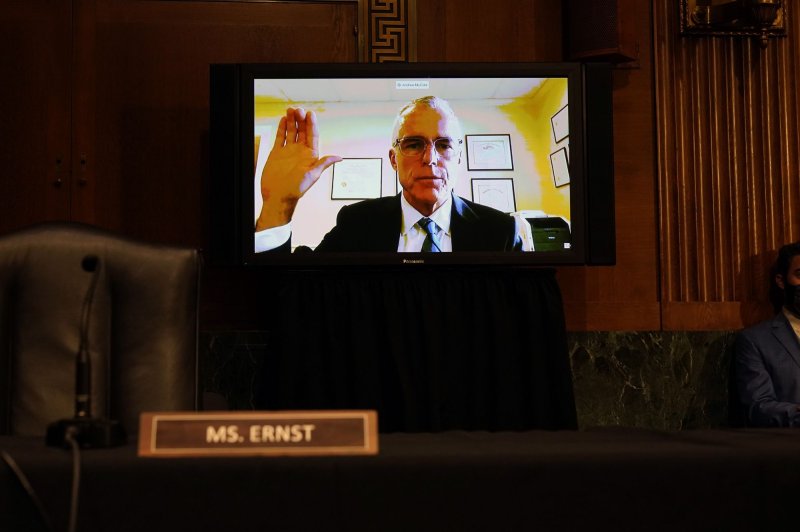1 of 2 | Former FBI Deputy Director Andrew McCabe testified that officials believed President Donald Trump "might himself pose a danger to national security" as the bureau was investigating his campaign's links to Russia. Pool Photo by Susan Walsh/UPI |
License Photo
Nov. 10 (UPI) -- Former FBI Deputy Director Andrew McCabe testified Tuesday that the bureau had reason to believe President Donald Trump was a threat to national security as he defended its investigation into the president and his campaign's alleged links to Russia.
Appearing before the Senate judiciary committee, McCabe cited Trump's decision to fire then-FBI Director James Comey in May 2017 after he refused to close an investigation into Trump's then-national security adviser, Michael Flynn.
"It became pretty clear to us that he did not want us to continue investigating what the Russians had done," McCabe said. "We had many reasons at that point to believe that the president might himself pose a danger to national security and that he might have engaged in obstruction of justice if the firing of the director and those other things were geared towards eliminating or stopping our investigation of Russian activity."
The FBI investigation examined possible links between Trump's campaign and Moscow and whether there was collusion to defeat Democratic presidential nominee Hillary Clinton in the 2016 election.
McCabe, who was fired by then-Attorney General Jeff Sessions two days before his scheduled retirement in early 2018, was originally set to appear before the committee last month but the session was postponed after several Republican senators tested positive for COVID-19.
Committee Chairman Sen. Lindsey Graham and Republican panel members are examining the FBI's investigation to see if its origins were politically motivated.
McCabe on Tuesday denied that politics played a role in the investigation.
"We didn't open a case because we liked one candidate or didn't like the other one," he said. "We didn't open a case because we intended to stage a coup or overthrow the government ... we opened a case to find out how the Russians might be undermining our elections. We opened a case because it was our obligation -- our duty -- to do so. We did our job."
In a report last year, Justice Department Inspector General Michael Horowitz found no political bias in the FBI's maneuvers -- but said there were some errors. Among them, he said, the FBI did not meet its responsibility of "heightened candor" when it gave Foreign Intelligence Surveillance Act warrants to wiretap then-Trump campaign aide Carter Page.
McCabe said he would not have approved the surveillance warrant for Page if he was aware of the errors.
"I was shocked and disappointed at the errors and mistakes that the [inspector general] found," he said. "To me, any material misrepresentation or error in a [wiretap] application is unacceptable. Period."
Graham asked McCabe who was "responsible for ruining Carter Page's life" to which McCabe responded, "We are all responsible for the work that went into that [warrant]."
Horowitz looked into the matter after complaints by Trump that the bureau unlawfully spied on members of his 2016 campaign and were motivated to help Clinton. His inquiry found no evidence to support those claims.
To date, there have been three hearings before the committee on the matter. During the most recent, in September, Comey defended the bureau's actions under his leadership.
Former Deputy Attorney General Sally Yates testified before the committee in August and former Deputy Attorney General Rod Rosenstein appeared in June.
Federal officials have said Russian actors also made efforts to intervene in the 2020 presidential election, in which former Vice President Joe Biden defeated Trump. He will take office in January, though Trump has yet to concede the election.















